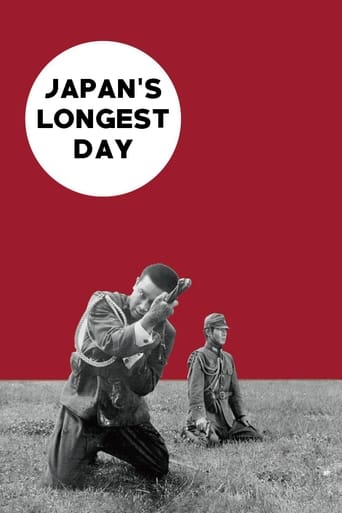WILLIAM FLANIGAN
Viewed on DVD. This is a daunting and action-packed drama featuring just about every famous/notable Japanese screen/stage actor living at the time (mid 1960's) plus one actress! A simply fascinating depiction of what might have gone on behind the scenes on the day of Japan's unconditional surrender (in 1945). It is a powerful antiwar film. A rich and well crafted script is combined with superb directing and some of the best screen acting since sound was introduced into Japanese movies. Cinematography and film score are extremely good. There are two choices of subtitle length: full and truncated. Chose the former (as need be) and just read faster to maximize the dramatic impact. A must see. WILLIAM FLANIGAN, PhD.
trevillian2
First off I would say you will want to watch this movie more than once for a couple of reasons. Main one for me is in reading the sub-titles etc. I missed out on a lot of the action and byplay of the various actors. Unless you are fluent in Japanese, you have to read to follow the plots, of which there are many. The subtitles pass so quickly that I was just getting the gist of the dialog in some spots, so I will need to watch again now that I have it down fairly well. There are so many roles to follow and all of them are interesting, so you don't want to let anyone fall away as he returns later in the film and you will want to remember what he was doing earlier in the movie. All are based on real people of the times, and very real events. As the story progresses I was caught up in the increasing action and urgency of the rebellion. The young officer who is so deeply involved and is such a zealot for the army continuing to fight is truly frightening as you can see some of this rabid resolve right now in some of these Jihad warriors in the mid-east. Just goes to show that Berserkers are not only from the days of Viking raiders. By the way this movie is not suitable for young viewers, it is matter of fact, but graphic in various death scenes.
nomoons11
Whether you already know about the events of the day of the Japanese surrender on August 15th 1945 or you are a newcomer to the topic, this film has something for both.Most film goers get to see the good guy side of films and rarely get to see a film made by the losers of war and the way they thought and felt. I've seen a few of these films from Japan and Germany and it's eye opening to see their mindsets during this period.Right off your gonna get a pretty clear picture that the Military ran the show. The Prime Minister of Japan was the guy who made the decisions along with the cabinet but Japan back in this time...was almost..if not...a military state. Behind the scenes you will see military men who know no other way of life, but it was all about to change...and they didn't react to well. I mean, who would enjoy surrendering? I know I wouldn't but what you get is an unruly few who think they have the will of the people and the emperor in mind when they decide to try and overthrow the Surrender Proceedings and takeover the Imperial Palace. Imagine being the most powerful force in the world for centuries and within a short span of 3 to 4 years...it's all over.It's just a fascinating watch all the way through to finally get to see what was in the minds of the Japanese Soldiers and Politicians during the last day before their surrender. Most accepted with regret..but with grace also. Others didn't take to it too well.If your looking for a war film with some action then you better look somewhere else cause this isn't that kind of film. This is war drama all the way. Watch this film and you'll get an idea of what it was like...back when "Japan's Longest Day" occurred.
PWNYCNY
What is a soldier, who has been told from first day of his enlistment that surrender is not only unacceptable but is treason, to do when he learns that his government, including his own military superiors, are going to surrender? This movie pulls no punches in showing what happened when that exact scenario occurred in Japan in the closing days of World War Two. The two words that can best describe how the Japanese soldiers must have felt are betrayal and despair. The movie further underscores the essential hypocrisy of the Japanese imperial leadership and the sudden realization that everything they had been spouting about the Bushido spirit was just hot air, mere hyperbole. As the movie so graphically shows, the junior Japanese officers who revered their generals simply could not accept what seemed to them a shameless repudiation of principles that they were told were sacrosanct. The movie is excellent for several reasons: first, it tells a compelling story; second, it has an all-star cast; third, it is structured as a documentary; fourth, the story is candidly and forthrightly portrayed; fifth, the movie has excellent continuity; sixth, it avoids becoming moralistic; and seventh, it educates the audience about a critical event in history.




